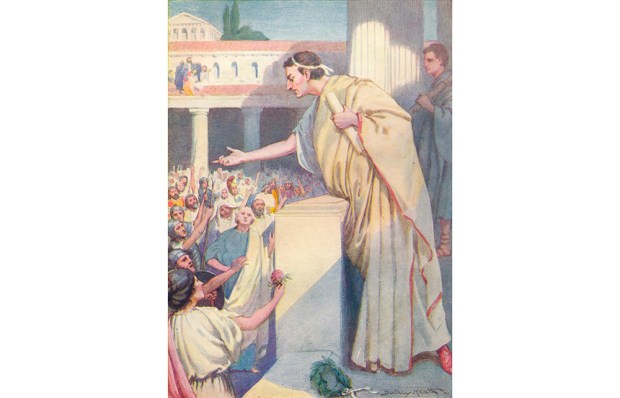Jeremy Corbyn regularly apologises on the subject of anti-Semitism, yet admits that he has done nothing wrong. So what does he actually mean by ‘apology’? He obviously does not feel the need to repent — the usual implication of the term — because he is convinced, as always, of his own unassailable rectitude. Perhaps it would clarify matters if he were to apologise in the Greek sense of the word.
Apologia meant giving an account of what you had done and justifying your reasons for doing it. It was primarily a legal term. Socrates’ ‘Apology’ in 399 bc, for example, was his defence against charges laid at his door of corrupting the young and introducing strange new gods. But it could be used in any number of contexts: defending one’s position in political debate, arguing a case on behalf of someone else, justifying oneself by reference to one’s actions, and so on.
The roots of apologia were apo (‘removing’) the logos (‘case’) which someone had brought against you. Logos (source of our ‘logic’ ‘-logy’) is in fact the most common noun in all Greek literature: ‘reckoning, reason, reasoned account, story, speech, thesis’ gives some idea of its range. That word lay behind a commitment to open, public debate that was at the heart of the Greek intellectual achievement. As a politician, teacher, litigant, doctor, artist, philosopher (and so on) in a radical democracy, people expected you to be able to give a logos — a reasoned, publicly intelligible account — of your actions or ideas, and to be open to a similar response.
Anti-Semites don’t speak for me, avers Corbyn. But he engages with anti-Semites at the many conferences he has attended and hosted, though claims not to have agreed with them. So let him ‘apologise’ by giving a full account of what he contributed at those many conferences, and in particular explain how he set about arguing against those with whom he claims to have disagreed on all these occasions. That would certainly vindicate his claim not to be anti-Semitic. So we look forward e.g. to him making the case against Israel being a racist, Zionist state. Surely that should be enough to convince his detractors.
Got something to add? Join the discussion and comment below.
Get 10 issues for just $10
Subscribe to The Spectator Australia today for the next 10 magazine issues, plus full online access, for just $10.
You might disagree with half of it, but you’ll enjoy reading all of it. Try your first month for free, then just $2 a week for the remainder of your first year.













Comments
Don't miss out
Join the conversation with other Spectator Australia readers. Subscribe to leave a comment.
SUBSCRIBEAlready a subscriber? Log in